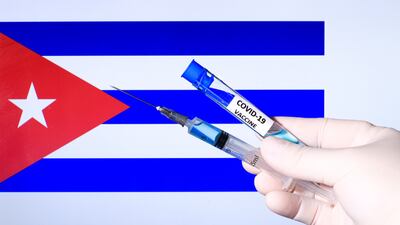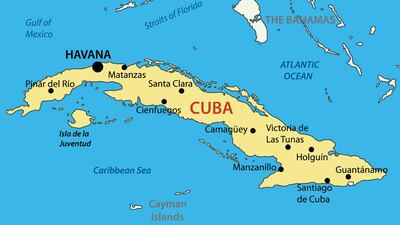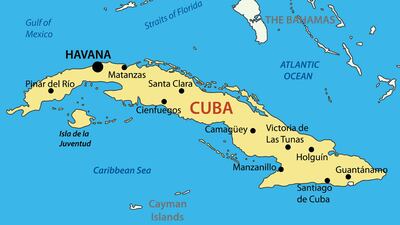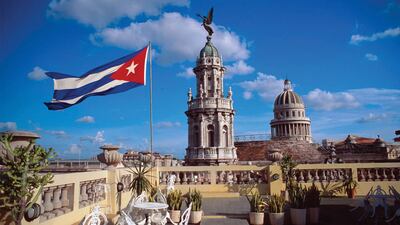Cuba
Country
Industry support for a new regional regulator for Latin America and the Caribbean is cautious and experts warn that it could harm competitiveness of the region.
Increasing the capacity for local development and production of medicines and other health technologies in Latin America and the Caribbean is among the objectives of the new deal.
Number of regulators formally agreeing to work toward creating Latin American regulator is growing.
The number of regulators formally agreeing to work towards creating a Latin American regulator is growing.
Medicines regulators from Mexico, Colombia and Cuba have pledged to create a new agency for medicines and medical devices of Latin America and the Caribbean.
Regulators in Mexico, Colombia and Cuba have affirmed plans to create a new Latin American and Caribbean Medicines Agency.
The Cuban government has approved the country’s home grown COVID-19 vaccine for emergency use in children, while Mexico is poised to authorize another Cuban vaccine.
At global level, Médecins Sans Frontières has called for all countries to support a revised version of the IP waiver for COVID-19 vaccines, singling out the recalcitrant European Commission for special attention.
Cuba is about to begin Phase III trials with one of its four homegrown coronavirus vaccines, Australia has provisionally approved the AstraZeneca/Oxford University product, and the EU has upped its orders from Pfizer/BioNTech and Moderna.
The UK BioIndustry Association has welcomed the government’s fresh investment in COVID-19 vaccine manufacturing capacity, while Sanofi and GSK are striking European and US deals for their vaccine candidate. A number of potential therapies are also being developed, including products based on interferon and hyperimmune globulin, but Roche/Chugai’s Actemra (tocilizumab) looks like a non-runner.
CECMED Director Rafael Pérez Cristiá discusses the drug regulator's increase international collaboration, connecting with industry and the relationship with US companies in an exclusive interview with the Pink Sheet.
Despite many restrictions, the nation is a potential market for imported drugs.
Cuba’s organic agriculture and its natural medicine tradition could provide herbal supplement firms substantial trade opportunities, says a Cuba economy expert. Awaiting a congressional vote to lift the trade embargo, companies on both sides of the Caribbean and the Cuban government are positioning themselves accordingly.
Abivax, a French clinical stage antiviral company, is using some of the €58m it raised in its June 2015 IPO to finance the late development of a promising anti-HIV compound and a potential therapeutic vaccine against chronic hepatitis B. CEO Dr. Hartmut Ehrlich reveals to Mike Ward, Informa Pharrna Insights global director of content, how Abivax is working to create a functional cure for HIV patients with a compound AB464 that modulates RNA splicing by inhibiting the activity of the RAF viral protein.
High inflation, a drop in the price of its commodities and restrictions on imports have not made for a good economic environment in Argentina and have proved a turnoff for investors. But a general election is around the corner and there are hopes that a new administration may set things right. So with change blowing in the wind, companies with flagging pipelines should consider what Argentina has to offer, not least a rich R&D community that helped create the world's first ever cancer vaccine against non-small cell lung cancer, and a vibrant local industry open to partnerships .
After more than five years on the job, Dr Raj Shah plans to step down as administration of the US Agency for International Development (USAID) – a departure that comes in the midst of the nation's efforts to respond to the Ebola epidemic in West Africa.
There's bound to be more questions raised than solutions found when putting a few hundred passionate scientists together in a room for two days.
While the US policy changes with Cuba and the cyber attack on Sony Pictures Entertainment, which the FBI said on 19 December was carried out by the North Korean government, took center stage at President Barack Obama's final press conference of the year, he also provided his perspective on what's ahead for tax reform in 2015 and efforts to stop inversion.
Argentinian firms have a surprising amount of expertise in the field of biosimilars, while a strong science base has fed healthy demand for locally manufactured products. Can the country elevate its early-stage research efforts to the next level without big pharma's dollars? Francesca Bruce investigates.
The US SEC has suspended trading in the tiny biotech newcomer GENova Biotherapeutics after its share price rose more than 30-fold. GENova burst onto the scene in September with a flurry of press releases about agreements it is signing.
ADVERTISEMENT













